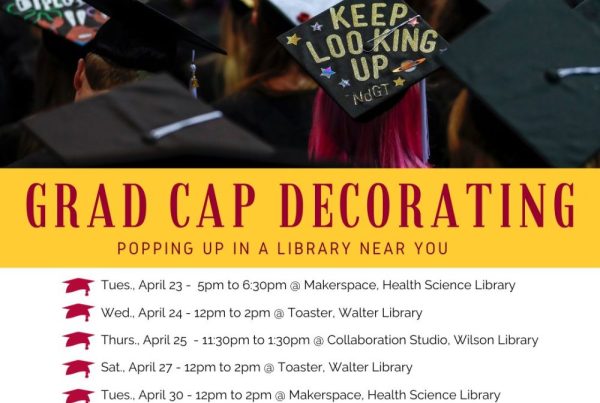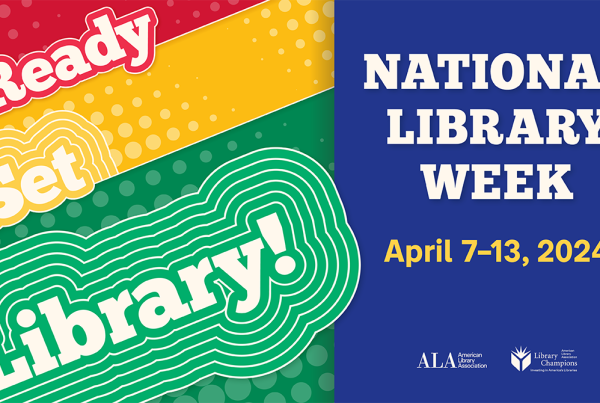By Ellen Engseth
Curator, Immigration History Research Center Archives and Head, Migration and Social Services Collections
I’ve been spending time in some seasonal letters within our collections. These letters, excerpted below, come from our curated collection of emotional transnational correspondence dating from the later 19th and into the 20th century, a collection called Digitizing Immigrant Letters. These letters are quite moving.
For example, we can read of a long-distance romance at Christmastime. Bert was a logger living in Big Falls, MN. He corresponded with a special friend back home in Finland, Hilma. In these letters we hear a longing for her as well as his former home, and learn he is sending her a gift, of a photograph.
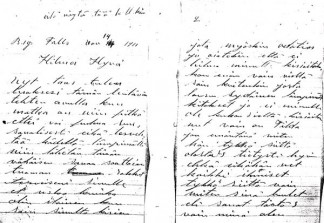 In November, 1911, he writes: “Don’t show this to anybody….I come to you as a flying leaf because the distance is too long for me to speak to you or to greet you with a warm hand. Thus I’m sending this insignificant messenger to bring my dearest greetings to you…. I have no girlfriend now, I guess I never have. I will tell you about my conditions here. I am working in the logging site again, I do all kinds of work in the forest and my salary is 3.00 dollars a month. Hear me Hilma, I am really planning to come to Finland next summer to have some fun. I have been here long enough. I want to see home again, and old friends. I don’t know if I have any left; maybe I have lost them all. But it is you that I want to see, and I don’t care for anybody else…I bought you a Christmas gift a while ago. I have had it since you sent me your picture….” (Full letter.)
In November, 1911, he writes: “Don’t show this to anybody….I come to you as a flying leaf because the distance is too long for me to speak to you or to greet you with a warm hand. Thus I’m sending this insignificant messenger to bring my dearest greetings to you…. I have no girlfriend now, I guess I never have. I will tell you about my conditions here. I am working in the logging site again, I do all kinds of work in the forest and my salary is 3.00 dollars a month. Hear me Hilma, I am really planning to come to Finland next summer to have some fun. I have been here long enough. I want to see home again, and old friends. I don’t know if I have any left; maybe I have lost them all. But it is you that I want to see, and I don’t care for anybody else…I bought you a Christmas gift a while ago. I have had it since you sent me your picture….” (Full letter.)
Bert, we gather from the letters, sent the gift, and received an encouraging letter in reply, because he writes next in January: “I’m also happy because you liked the picture that I sent you….And it’s nice that always when you look at the picture, you will remember old Little Bert, especially if we never see each other again, if I just keep wandering on this complicated life-path and you stay in that beloved native land. It’s too long a distance to be talking to each other or looking into each other’s eyes. But I have been thinking and imagining in my mind how it would be to visit home…. Only I’m living here among strangers who speak only foreign languages; you can’t hear our mother tongue here. But I’m also happy that I’m healthy and cheerful, I don’t have any sorrows, and if I sometimes do, my happiness prevails. I also have a desire to see and learn from this world, and I don’t think I will gain anything else than what I learn from this.” (Full letter.)
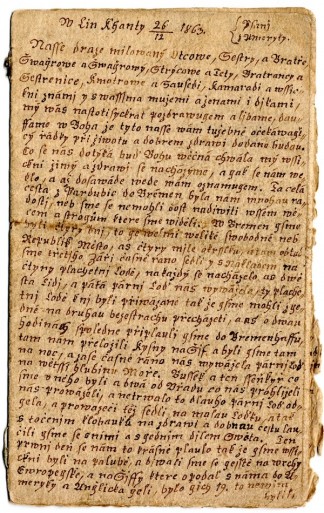 In another letter, a young and religious immigrant named Jozef recognized his father would likely die soon, and poignantly refers to this in a December letter written from Iowa in 1863 (during the American Civil War) to relatives in Bohemia: “A letter from America. Our dearly beloved…we are greeting and kissing you one hundred thousand times, hoping in God that these lines of ours, longingly awaited, will be delivered to you while you are alive and in good health. As for ourselves, praised be God forever, we are all alive and healthy, and how we have been so far we would like to let you know…. One more time we are sending you one hundred thousand greetings and kisses and wishing you a happy new year. And if perhaps this letter is for some of you our first and last, especially you, our old father, since according to human understanding your grave is perhaps drawing nearer, so rest your gray head in peace and take consolation in your descendants reaching their happy destinations, and hope that after not too long a time our dear God will re-unite us. [Italics added] I will end my letter with that. I would invite you here, for my first wish would be to see you again…. But now I’d rather wait to see how it is going to end up with the war. Meanwhile I will settle down so that you could come and join me. If you have shed any tears for us, you can dry your eyes now. It’s been going well for us, and if it is God’s will for us to meet again, then we will talk about what we are holding in secret now….” (Full letter.)
In another letter, a young and religious immigrant named Jozef recognized his father would likely die soon, and poignantly refers to this in a December letter written from Iowa in 1863 (during the American Civil War) to relatives in Bohemia: “A letter from America. Our dearly beloved…we are greeting and kissing you one hundred thousand times, hoping in God that these lines of ours, longingly awaited, will be delivered to you while you are alive and in good health. As for ourselves, praised be God forever, we are all alive and healthy, and how we have been so far we would like to let you know…. One more time we are sending you one hundred thousand greetings and kisses and wishing you a happy new year. And if perhaps this letter is for some of you our first and last, especially you, our old father, since according to human understanding your grave is perhaps drawing nearer, so rest your gray head in peace and take consolation in your descendants reaching their happy destinations, and hope that after not too long a time our dear God will re-unite us. [Italics added] I will end my letter with that. I would invite you here, for my first wish would be to see you again…. But now I’d rather wait to see how it is going to end up with the war. Meanwhile I will settle down so that you could come and join me. If you have shed any tears for us, you can dry your eyes now. It’s been going well for us, and if it is God’s will for us to meet again, then we will talk about what we are holding in secret now….” (Full letter.)
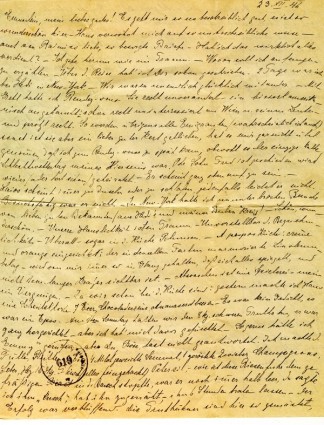 On a light and cheerful note, a newcomer from Austria named Malvine found life in 1940s mid-America (Champaign, IL) lots of fun, a bit tacky, and full of conveniences and new ways to celebrate: “Tomorrow is Christmas Eve. Everywhere you hear Holy Night being sung and played. Here the Christmas tree in all the houses is lit up for the whole Christmas week with unveiled windows. – I’ve got something new as lighting. Small, multi-coloured, glass ball with glass tubes, in which a phosphorescent fluid moves (naturally lit electrically), on top a Christmas Angel with electr[ically] lit halo. The thing is quite tacky and tasteless – but new and effective – that is the main thing that matters here. – The manner of giving gifts is nice. – The gifts are sent to the house 8-10 days before Christmas Eve in fantastically beautiful packaging, you have no idea in Europe of this luxury and imagination. – On each package it says “from _ to_” and “Don’t open before 25th Dec.”. When a visitor drops by, then he brings such a delightfully packaged parcel with him, and throws it under the Christmas tree. – also for the guests who come on the 25th, there are packages from their gift givers under the tree. – And then you say: “Now I’m going to open my packages – The new arrangement in the new world. But all in all, it’s nice where there is love and peace.” (Full letter.)
On a light and cheerful note, a newcomer from Austria named Malvine found life in 1940s mid-America (Champaign, IL) lots of fun, a bit tacky, and full of conveniences and new ways to celebrate: “Tomorrow is Christmas Eve. Everywhere you hear Holy Night being sung and played. Here the Christmas tree in all the houses is lit up for the whole Christmas week with unveiled windows. – I’ve got something new as lighting. Small, multi-coloured, glass ball with glass tubes, in which a phosphorescent fluid moves (naturally lit electrically), on top a Christmas Angel with electr[ically] lit halo. The thing is quite tacky and tasteless – but new and effective – that is the main thing that matters here. – The manner of giving gifts is nice. – The gifts are sent to the house 8-10 days before Christmas Eve in fantastically beautiful packaging, you have no idea in Europe of this luxury and imagination. – On each package it says “from _ to_” and “Don’t open before 25th Dec.”. When a visitor drops by, then he brings such a delightfully packaged parcel with him, and throws it under the Christmas tree. – also for the guests who come on the 25th, there are packages from their gift givers under the tree. – And then you say: “Now I’m going to open my packages – The new arrangement in the new world. But all in all, it’s nice where there is love and peace.” (Full letter.)
With Best Wishes for the holidays you celebrate, from the Immigration History Research Center Archives!


